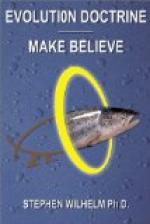And so we must approach the study of the several divisions of our subject in this frame of mind. We must meet many difficulties, of which the chief one is perhaps our own human nature. For we as men are involved, and it is hard indeed to take an impersonal point of view,—to put aside all thoughts of the consequences to us of evolution, if it is true. Yet emotion and purely human interest are disturbing elements in intellectual development which hamper the efforts of reason to form assured conceptions. We must disregard for the time those insistent questions as to higher human nature, even though we must inevitably consider them at the last. Indeed, all the human problems must be put aside until we have prepared the way for their study by learning what evolution means, what a living organism is, and how sure is the evidence of organic transformation. When we know what nature is like and what natural processes are, then we may take up the questions of supreme and deep concern about our own human lives.
* * * * *
Human curiosity has ever demanded answers to questions about the world and its make-up. The primitive savage was concerned primarily with the everyday work of seeking food and building huts and carrying on warfare, and yet even he found time to classify the objects of his world and to construct some theory about the powers that made them. His attainments may seem crude and childish to-day, but they were the beginnings of classified knowledge, which advanced or stood still as men found more or less time for observation and thought. Freed from the strife of primeval and medieval life, more and more observers and thinkers have enlarged the boundaries and developed the territory of the known. The history of human thought itself demonstrates an evolution which began with the savages’ vague interpretation of the “what” and the “why” of the universe, and culminates in the science of to-day.
What, now, is a science? To many people the word denotes something cold and unfeeling and rigid, or something that is somehow apart from daily life and antagonistic to freedom of thought. But this is far from being true. Karl Pearson defines science as organized knowledge, and Huxley calls it organized common sense. These definitions mean the same thing. They mean that in order to know anything that deserves confidence, in order to obtain a real result, it is necessary in the first place to establish the reality of facts and to discriminate between the true, the not so sure, the merely possible, and the false. Having accurate and verified data, scientific method then proceeds to classify them, and this is the organizing of knowledge. The final process involves a summary of the facts and their relations by some simple expression or formula. A good illustration of a scientific principle is the natural law of gravitation. It states simply that two bodies of matter attract one another directly in proportion to their mass, and inversely in proportion to the square of the distance between them. In this concise rule are described the relations which have been actually determined for masses of varying sizes and at different distances apart,—for snowflakes falling to the earth, for the avalanche on the mountain slope, and for the planets of the solar system, moving in celestial cooerdination.




